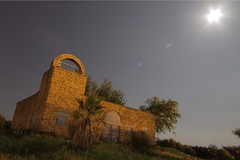
Late afternoon sun filters between tall pines, a splotchy canvas of black, green, gray, and gold. The hypnotically undulating road gently curves around discreet hills. Off to the left, a sandy driveway leads to a large clearing full of cremated appliances—the ancestors of your washer and dryer. The mechanized mausoleum is surrounded by a perimeter of wooden shacks in different phases of termite destruction. At the entrance of the clearing, a relatively new sandwich board announces "Big Red's Soul Food" in bold white text. Nobody is visible.
Two young black men ride horses along the roadside, working their way towards the Lone Star Trail that runs through the forest of Southern Pine. One seems to be teaching the other to ride. Their horses are calm when cars pass by.
Sam Houston may have been an egoist and a self-promoter, but the forest that bears his name is pleasant and understated. Mosquitoes will remain scarce until the summer rains begin, their weak population further stunted by voracious dragonflies patrolling the banks of a nearby lagoon. Cicadas fill the forest with an overwhelmingly loud white noise as the deep blue sky fades into gray dusk. When night closes in, the frogs take over noisemaking duties and a single firefly zigzags aimlessly through wooden pillars. The air is wet and still, qualities that make it feel omnipresent and forgotten all at once, like falling asleep in a warm bathtub. Other than a few feral pigs in the bushes, the forest is empty.





















